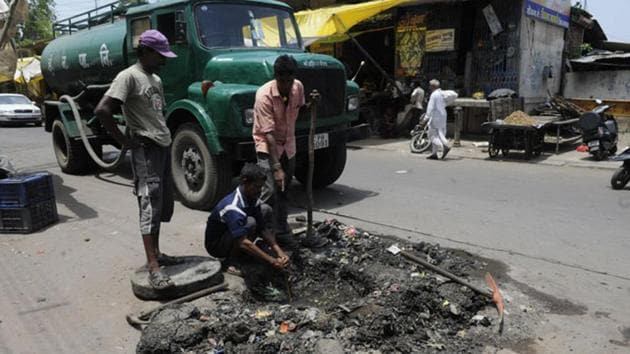In between manhole and machine hole
With the surge of mechanisation, sanitation workers need to be reorganised on a large scale to reinstate a permanent structure in the system.
Workmen, collectively, are indispensable because within their union lies the power of bargain. Sanitation workers not only need new systems of mechanisation but also economic, social and political tools to have an upper hand on the contractors.

With the surge of mechanisation, sanitation workers need to be reorganised on a large scale to reinstate a permanent structure in the system. This labour concentration is required to weaken the solidarity of the oppressors who also need severe mechanisation to fix their caste bias.
The first question is whose capacity will the Centre build when it seems they don’t even know who these sanitation workers are? Their lack of sociological understanding is evident in their failure of inclusion of sanitation workers in proposed plans devised for their benefit. Another aspect is that if the number of workmen is unknown, any plans of direct monetary support is far away from reality. On the ground the states have always refused to recognise the existing categorisation of sanitation workers, therefore, when it comes to the work of scavenging only sewer cleaners come to mind. Therefore, the missing link between manhole to machine hole transformation is a need for a mobilisation movement so that sanitation workers of different categories can be at the front and centre of decision making. An alliance of all categories will not only help in their realistic recognition but also protect their interests.
The second question is what are the concrete steps that the Centre and state will be taking in improving the lives of the one who will be using these machines? How will a minimum standard of the wages be insured? It is true that sanitation workers have fought for themselves through unionisation even before this new introduction of machinery but now it is the time for them to reinstate themselves into a labour movement immediately otherwise the Centre will take over the real social function of their unionisation.
Mechanic output realisation has historically given the employers the ability to own the employee. It is also true that when the mass mobilisation of the sanitation workers will become visible political parties will understand the value of taking sanitation workers on board. The fist agglomeration of workmen by NM Lokhande was in response to the draconian Factories Act of 1881 by the British government. It was at this time that the working class realised how strikes can be held to gather actualised concessions. The success of these opened the way for many types of mobilisation.
The formation of All India Trade Union Congress (AITUC) and Trade Unions Act in the 1920s and then the starting of All India Trade Union Federation mobilised many labourers altogether but rapid politicisation also confused them. Also, when the leaders will become powerful, stained tactics will be used to lure them like the Cawnpore conspiracy case. In the post independent era trade unions in India had a linear weave along with socialist and communist tendencies but post-liberalisation the actual membership tally also started becoming complicated because of the rise of workforce from the informal sector.
Sanitation workers in that case will also suffer the same complications as within different categorisations the number of people entering into the septic tanks have many other seasonal occupations. The nature of the Indian labour is that it does not remain in one job for very long. The Indian labour is rooted in the village who migrate heavily to the cities to become a sanitation worker. Therefore, the third question is: To whom the Centre will give training if the sanitation workers who used to enter the septic tanks do not come out in the open? Large degree of labour turnover and lack of adequate provisions for the sanitation workers will start an effect that there will be a possibility that the upper caste men will begin occupying these machines and force the sanitation workers to assist them through manual jobs.
Similarly, the fourth question is whose job it will be to ensure the implementation of the usage of this machinery? To whom the training will be given to also fix the machinery? The fifth question is whose insurance it will be that the contractors will not force sanitation workers in semi-urban and rural areas to enter into the septic tanks? Unionisation in this regard has the power to not only protect the sanitation workers but also improve their political standing. This in turn will free them from contractual exploitation and ownership. Sanitation workers will have to take the strict compliance of legal regulation in their own hands.
They will have to be more than strike committees and refrain from multiplicity of unions and inter union rivalries only then every death case will haunt the lawmakers for posterity. Now, the Centre will have to understand that India’s sanitation workers need a ‘safai karmachari mitra’ more than a ‘safaimitra.’ Till that time sanitation workers will have to protect their own interest themselves through responsible trade union leadership.
Pragya Akhilesh is the secretary of Bhim Safai Karmachari Trade Union and the national convener of Rehabilitation Research Initiative, India
(The views expressed are personal)



